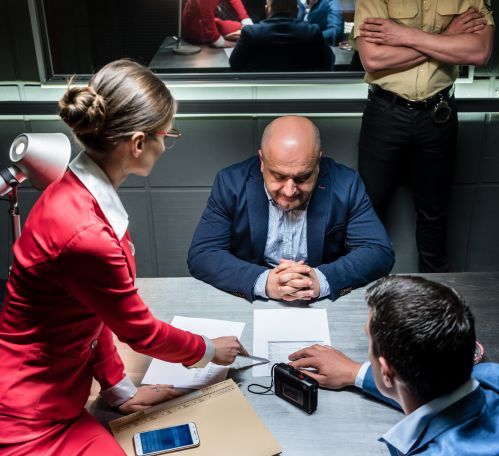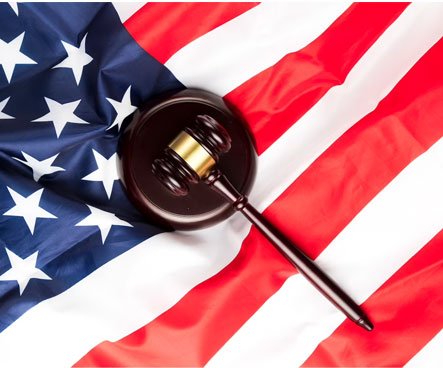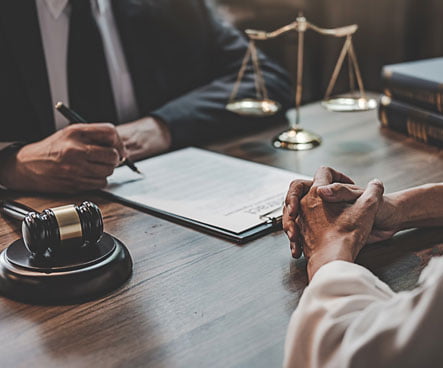Atlanta Federal Conspiracy Attorney

Atlanta Federal Conspiracy Lawyer
Being charged with federal criminal conspiracy can be shocking and overwhelming. At The Law Office of Lawrence J. Zimmerman, our Atlanta conspiracy attorney team has years of experience taking on cases similar to yours. Our firm can muster all our resources to work toward de-escalating the situation and optimizing your case outcome.
Whether you have been charged with distributing drugs or possessing drugs in a manner that elicits federal conspiracy, or if you have fraud-related charges, a criminal defense lawyer from our Atlanta-based team can work with you to collect evidence and develop a sound defense strategy. That way, you can focus on moving forward with your career and your life.
What Are Atlanta Conspiracy Charges?
Conspiracy has a broad legal definition. Generally, it is an agreement that is made between two or more individuals to commit a crime or engage in an activity that is counter to the law. Each party in the conspiracy agreement must agree to carry out the illegal activity together, and this is the main reason why the agreement is made.
For individuals to be engaged in an act of conspiracy in Atlanta, they do not necessarily have to be aware of all the details of the planned illegal activity. For an individual to be charged with and convicted of conspiracy, they just have to know that some part of the agreement that they are engaged in is illegal.
It’s also important to keep in mind that an individual charged with engaging in an act of conspiracy is also responsible for any illegal actions that are carried out to achieve the goals of the contrived plan by their co-conspirators. If the crimes were committed prior to the individual joining the conspiracy, then they cannot be held accountable for those actions. The same logic goes if they left the conspiracy. They cannot be held liable for actions carried out by co-conspirators after leaving the plan.
What Is the Law Regarding Federal Conspiracy?
Under federal law, there are multiple statutes that define conspiracy in federal criminal terms. 18 U.S.C. § 371 is a general federal conspiracy statute that makes it a federal crime to conspire in any way against the United States government. In addition to this, defrauding the U.S. is illegal.
There are further statutes in the federal criminal code that specify certain conspiratory offenses. Examples include 18 U.S.C. § 1349, which makes it a crime to conspire to commit federal fraud, such as wire or securities fraud, and 21 U.S.C. § 846, which outlaws conspiring to commit drug trafficking.
Defrauding the United States Federal Government
Conspiracies to defraud the United States government are covered under Section 371 as well. They are loosely defined as a conspiracy that is contrived for the objective of impairing, obstructing, or defeating the legal functioning of the federal government while employing the use of dishonesty or deceit.
While such a conspiracy can include impairing the general functioning of a government department or entity, it can also mean taking or cutting off assets or property from the federal government. It’s important to know that conspiracies do not have to be made particularly against the federal government to be considered federal conspiracy. Under general conspiracy, any conspiracy to commit a federal crime is sufficient to bring charges.
Proving Federal Conspiracy Crimes
If you have been charged with a federal crime under 18 U.S.C. § 371, then the United States government must prove that certain elements of the crime were present to convict you of the charges. Characteristics of the conspiracy crime that must be proved include:
- Two or more individuals made an agreement and planned together to carry out a federal crime or defraud the U.S. government.
- The accused deliberately and consciously joined the conspiracy efforts.
- The accused carried out a specific action to further the objectives of the conspiracy.
It’s important to note that proving that someone agreed to commit a conspiracy can have complex legal implications. Evidence of a formal agreement does not have to be brought forward by the prosecutors. An agreement can be proven through analyzing the circumstances of the case, such as the specific actions that the defendant carried out to further the conspiracy case.
FAQs About Atlanta, GA Federal Conspiracy Laws
How Is an Atlanta Conspiracy Charge Different From a Crime Charge?
In the state of Georgia and the United States, there is a clear difference between the conspiracy to commit a crime and actually committing the crime. For example, an individual can face charges for conspiring to launder money under 18 U.S.C. § 371, but they can also face charges for actual money laundering under 18 U.S.C. § 1956.
How Can Federal Prosecutors Prove “Agreement” in Conspiracy Charges?
Proving that a defendant was in willful and knowing agreement with co-conspirators to carry out a federal crime works differently in each case, depending on the charges and the case details. Having knowledge about the existence of a conspiracy is not sufficient to prove agreement. However, it is relatively easy for federal prosecutors to prove agreement, as they only have to show that there was a mutual understanding between the accused and the co-conspirators.
What Is the Statute of Limitations for Federal Conspiracy?
If the offenses charged by the U.S. government are non-capital or are other general conspiracy offenses that don’t have their own statute of limitation periods, then the period is typically 5 years. The statute of limitations timeframe officially starts when the last overt act is carried out for the furtherance of the conspiracy.
Do All Federal Conspiracy Charges Require Proving That Overt Acts Were Committed?
While many federal conspiracy charges do require proof that a defendant carried out an overt act to have a conviction, not all conspiracies require overt acts. Examples include conspiracies against the Sherman Antitrust Act (15 U.S.C. § 1), conspiracies relating to drug trafficking (21 U.S.C. § 846), and conspiracies against the RICO Act (18 U.S.C. § 1961).
Defend Yourself Against Atlanta-Based Federal Conspiracy Charges
If you are facing federal conspiracy charges, you may be wondering what exactly you have been accused of and what the possible penalties and outcomes of your case might be. An experienced Atlanta criminal defense lawyer from The Law Office of Lawrence J. Zimmerman can help inform you about the implications of your charges, analyze the evidence brought forward by the prosecution, and find weaknesses in their argument. Contact our office today to set up an initial consultation.
Office Location
Meet With A Lawyer
Schedule A Consultation
Fields Marked With An “*” Are Required









